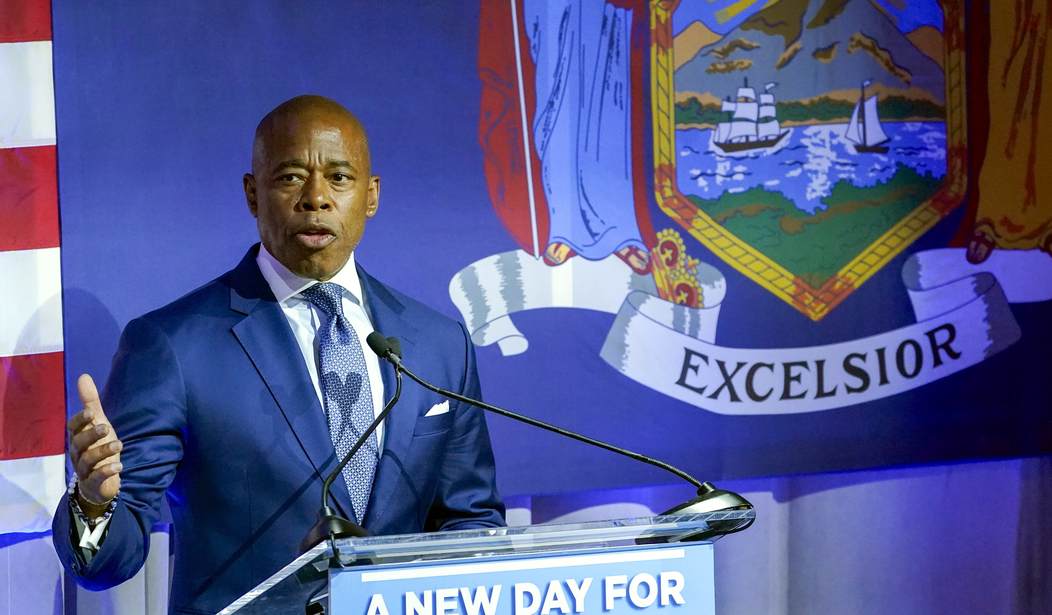New York Mayor Eric Adams seemed a pitiable figure Wednesday when publicly discussing the overwhelming number of migrants, many illegal, his city has seen added to its already-teeming shore since April of last year, with some estimates as high as 10,000 new migrants every month.
And it’s tempting to pity him, until he gets to the part – as he did at that Wednesday Upper West Side Town Hall meeting – of excoriating Texas Governor Greg Abbot as a “madman” for finally allowing so-called sanctuary cities like New York to experience what border towns have experienced for years; and only meekly chiding the Biden Administration – the undeniable source of the problem – for failing to heed calls for help.
In short, Adams can’t even accurately identify the problem – which, as I’ve written before, lies squarely in the Biden Administration’s chaotic border non-policy that not only all but invites illegals to risk a trip through the Southern border, but funds their movement and shelter via nonprofits once they’re here.
In fact, an April 2023 Government Accountability Office (GAO) report found that “[i]n fiscal years 2019, 2021, and 2022, [the Department of Homeland Security grant program] provided more than $282 million to reimburse nonprofits and governmental organizations for their services” related to border and illegal immigration.
Perhaps, since the Biden administration is both causing the problem and turning a deaf ear to cries that things have gone too far, Adams can turn to Republicans for help as he unravels the mystery of how he got here.
Chris Chmielenski, director of content and activism at NumbersUSA, says hope for Adams lies in a bill passed by Republicans in the U.S. House of Representatives in May called The Secure Border Act of 2023.
“The only way you can stop [illegal immigration] is to send a loud and clear message…that you’re not getting in,” Chmielenski says.
Recommended
Since that’s obviously not a priority for the Biden administration, the House-passed legislation could be a loud and clear message from another branch. A piece NumbersUSA website explains what the legislation does:
Among other things, the bill would close loopholes that are driving the current crisis, like asylum abuse, nonsensical unaccompanied alien children (UAC) policy, categorical parole programs, and the Flores court settlement. In addition, the legislation would mandate E-Verify, thus shutting off the jobs magnet enticing illegal aliens to enter the United States. Combining E-Verify with closing of the loopholes would dramatically reduce the pull factors that have left our Federal bureaucracy and local communities overwhelmed.
Unfortunately, because Senate Democrats have signaled support for Biden’s border non-policies, the act is likely DOA in the Senate.
But, says Chmielenski, that doesn’t mean it has to be DOA for good. Using the looming government shut-down over a must-pass spending bill and attaching a rider with the legislative language of The Secure Border Act of 2023 could achieve Republican goals of helping stem the tide of illegal immigration – and help Adams finally see a light at the end of the tunnel of his city’s existential crisis.
As the NumbersUSA piece notes:
[T]he American people are not nearly as concerned with the government shutting down as they are with the border being wide open. Immigration polling makes that clear. They also are well aware of the theatrics and rhetoric of shutdown fights from the past. The approval ratings for Congress make that clear. Instead of worrying about being blamed for a shutdown, Speaker McCarthy should worry about being blamed by voters for not doing anything about the border. Angry voters will not be persuaded that passing H.R.2 was sufficient when their communities are overrun. Congress has the power of the purse for a reason, and it’s time they used it.
Chmielenski says the number of purple-state Senate Dems soon up for re-election is more than 20, and he thinks these legislators are vulnerable and might be persuaded to pass the spending bill – even with immigration language – to assuage voters and avoid a shut-down.
In the meantime, he does reserve some sympathy for Adams other sanctuary city leaders who are beginning to understand how overwhelming an open border is to cities attempting to accommodate migrants. But he also recognizes they’ll have to move past something they generally cling fast to: politics.
“[Adams] is looking for effective policy choices, but he’s playing politics for now,” Chmielenski says.
Ironic that what might save him is DC Republicans playing a little politics of their own.

























Join the conversation as a VIP Member